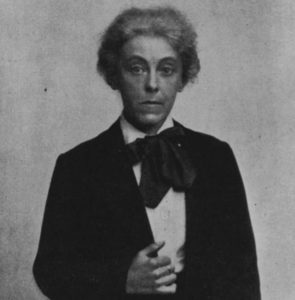Charlotte Mew’s Fearful Longings
“Charlotte Mew: Madness and Sapphic Desire,” by Rebecca Batley introduced me to this slightly mad, brilliant, and reclusive poet. Almost immediately she reminded of some closeted Catholic lesbians that I have met. These women longed for love and sex but were fearful of acting on their desire. They were afraid of losing their respectability; and the tension between their religious faith and sexual need filled them with dread and a sense of loss. No wonder they were a little unhinged. Deeply closeted women often don’t read signs well, and can fixate on women who aren’t interested in them. This results in a predictable rejection. 
Charlotte “Lotti” Mary Mew was born on November 15, 1869, in London, England. Several of Mew’s siblings suffered from mental illness and were committed to mental institutions. This scared Charlotte and her remaining sister Anne, so much that they made a pact never to marry. In 1898, their father died without leaving any money for the family. This forced the Mews to rent out part of their home, and Charlotte took a job.
As a schoolgirl, Charlotte fell in love with her headmistress, Lucy Harrison. Harrison herself fell in love with a teacher named Amy Greener, and they moved away. Mew had two other serious crushes: the writer Ella D’Arcy in 1898 and popular novelist and suffragette May Sinclair nine years later. Her loves were unrequited. There is no information on whether Charlotte’s physical longings were ever consummated with anyone, but her poem, There Shall Be No Night There describes a tender fantasy:
“Then through my blood the coming mystery
Of night steals to my heart and turns my feet
Toward that chamber in the lamp-lit street,
Where waits the pillow of thy breast and thee.
‘There shall be no night there’—no curtained pane
To shroud love’s speechlessness and loose thy hair
For kisses swift and sweet as falling rain.
What interested me the most about Charlotte Mew was the tension between her religious belief and her lesbian desire. Tensions and strains between our physical and spiritual selves have ripped apart, wounded, or maimed many lesbians. Charlotte Mew was no exception. Does God love me for who I am and what I am? Many lesbians have concluded that the answer is “No,” and leave religion to end their isolation and painful loneliness. Mew stuck with religion but suffered. She believed, but she also carefully coded her desires and doubts in her poetry:
“I think my body was my soul,
And when we are made thus
Who shall control
Our hands, our eyes, the wandering passion of our feet,
Who shall teach us
To thrust the world out of our heart: to say, till perhaps in death,
When the race is run,
And is forced from us with our last breath
“Thy will be done”?
“Madeleine in Church” by Charlotte Mew (1916)
In 1926, her sister, Anne, was diagnosed with cancer. Charlotte took care of her until she died in 1927. After her sister’s death, she became deeply depressed and entered a nursing home. She committed suicide by drinking Lysol, a disinfectant. Charlotte Mew died on March 24, 1928, at the age of fifty-eight. 
Charlotte Mew is buried with her sister Anne in Hampstead Cemetery, West Hampstead, London. The epitaph reads, “Cast Down the Seed of Weeping and Attend.” The phrase is from The Divine Comedy by Dante Alighieri, translated by Henry Wadsworth Longfellow, Vol. II (Purgatorio), Canto XXXI (31). Dante meets his ladylove, Beatrice, and recalls his love for her. She admonishes him.
“Cast down the seed of weeping and attend;
So shalt thou hear, how in an opposite way
My buried flesh should have directed thee.”
“Never to thee presented art or nature
Pleasure so great as the fair limbs wherein
I was enclosed, which scattered are in earth.”
The dismal reproach to follow a “higher good” instead of human love followed poor Charlotte Mew to her grave.
I wish instead to provide her and her work and art a happier ending, inspired by Psalm 126:6 –
“Those who go forth weeping,
Carrying sacks of seed
Will return with cries of joy,
Carrying their bundled sheaves.”
Almost 100 years after Charlotte Mew’s death, there are lesbians of faith who are married, enjoying the physical delights of a loving relationship, and looking forward together to the promise of salvation and eternal life.
The Farmer’s Wife, a poem by Charlotte Mew read by Tom O’Bedlam
